As we move into the 'new normal' of the events industry, it's clear that events are going to look and feel very different. New and improved hygiene measures, layout changes and of course PPE will be part and parcel of safer events going forward.
When it comes to PPE, there's a whole array of equipment out there so it can be hard to know where to begin. Luckily, we've put together an ultimate guide to buying PPE to get you started on your safety journey, whether you're planning an event or hosting one at your venue.
Below is all the PPE you should be using for events going forward, which you can purchase at our Safer Events Shop. Download our Safer Events White Paper - A Framework For Action for more information on safer events measures.
Table of Contents
1. Face masks
2. Gloves
3. Thermometers
4. Floor markings
5. Hand sanitisers and wipes
6. Sneeze guards
7. Things to remember
Face masks
They're compulsory on public transport and from 24 July, face masks will be compulsory in shops too, so it's important to stock up on appropriate face coverings for your staff and delegates (although if delegates are arriving by public transport they should already be wearing their own).
There are lots of different types of face mask available, but there are several considerations to make when selecting one.
Which one should I go for?
We recommend a standard surgical mask made from polypropylene with a cotton lining and nose wire. You can purchase these single-use masks in bulk from our Safer Events Shop and they're perfect for day events. You can even get £5 off your first order using this link. 5% of all proceeds go to NHS Charities Together.
For larger events, or medical staff, it is worth considering purchasing KN95 Respirators. These are closer fitting respiratory protective devices which may provide a better level of protection and may be more suitable for larger events when permitted from 1st October.
Face masks can make it difficult for deaf people or those hard of hearing to understand what's being said to them. London charity Action on Hearing Loss has devised an information card with tips for people with hearing loss, and The Independent has put together a guide for where to buy transparent face coverings. This may be something to consider for your speakers, so that any delegates who are hard of hearing can still lip read and understand the content sessions.
How should it fit?
Masks should fit snugly to the face, over the bridge of your nose and under the chin. You should be able to breathe comfortably while wearing it. Those who wear glasses should opt for a tie face covering so the fit can be adjusted and made tighter, which will prevent glasses steaming up.
The World Health Organisation (WHO) has created a series of videos to show people how to use face coverings properly, so it's worth creating signage or posters to display in your venue to instruct delegates. For example, hands should be cleaned before putting on a mask, and you should not be touching your face once the mask is on.
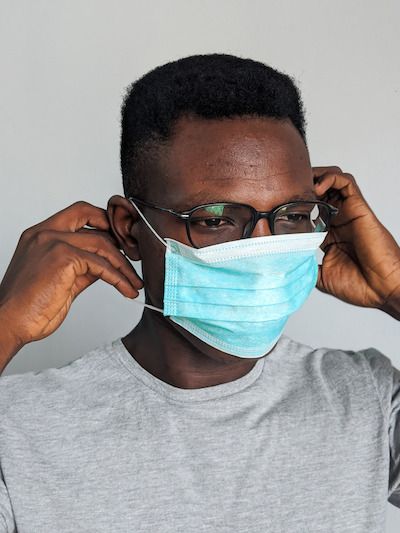
Gloves
Gloves create a barrier between germs and your hands and can help prevent the spread of germs at your event. Providing gloves for all members of staff (not just catering staff) will not only inspire confidence that every measure possible is being taken to ensure every delegate's safety, but will also reassure staff and help them to feel safe too.
We recommend these basic, latex-free, single-use vinyl gloves for your events. Buy them in bulk and keep a stock at the venue to make sure there are always gloves available, as some delegates may prefer to wear gloves too.
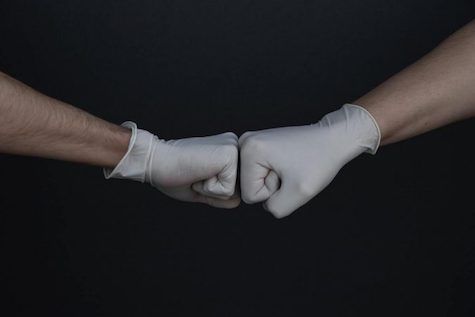
Thermometers
In some countries, such as China, event organisers and venues are taking their delegates' temperatures on arrival to the event. Currently, this isn't mandatory in the UK, however it is good practice as part of the delegate screening process e.g. if a delegate has symptoms and/or a temperature of 38C or higher, they should not be permitted entry to the event.
To minimise contact and limit risk of transmission further, we advise completing these temperature checks with a digital infrared forehead thermometer.
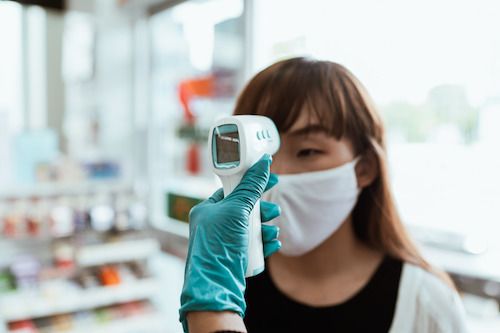
Floor markings
There's little point in ensuring all of the mentioned hygiene and safety measures are in place if there is no social distancing in place. Although the official distancing guidelines have been reduced from 2m to 1m to allow businesses to reopen, it's still a good idea to maintain 2m where possible, especially for larger events. If this isn't possible, it's important to amp up safety measures such as increased use of hand sanitiser.
Setting up a one-way system, reducing capacities in spaces throughout the venue and installing plenty of signage will reduce contact and help maintain social distancing. These vinyl social distancing floor stickers are waterproof, durable under foot and perfect for entry, exit, queues, and areas that might be otherwise congested.
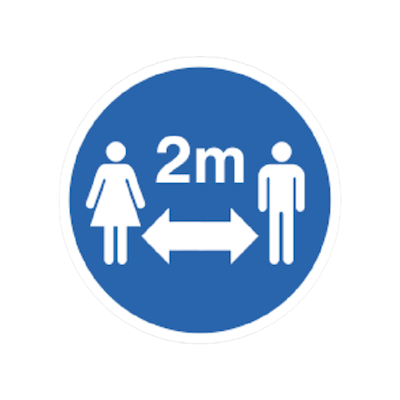
Hand sanitisers and wipes
Hand washing or the use of hand sanitiser is going to be a crucial condition of attending events. It's important to provide hand sanitising stations at your event/venue so that delegates can frequently clean their hands and limit the risk of transmission. We recommend using a hand sanitiser that contains at least 60% ethanol like this one, and we also advise using a contactless sanitising station to really limit contact.
Providing disinfectant wipes for delegates and staff members to use throughout the day is also a good idea. These wipes are individually wrapped for hygiene and are a convenient way for delegates and staff to clean and disinfect hands or surfaces as required. You could even set them out at the entrance to the event as part of an arrival goody bag, also containing a mask, gloves, and any information the delegates may need such as the location of the medical station if they fall unwell.
You could also go one step further and equip yourself with this contactless UV-C sanitising wand which can be used to sterilise frequently touched equipment such as microphones. These wands are third party scientifically tested and proven to kill up to 99.9% of germs, and the UV-C light is approved by the NHS and used in hospitals worldwide.
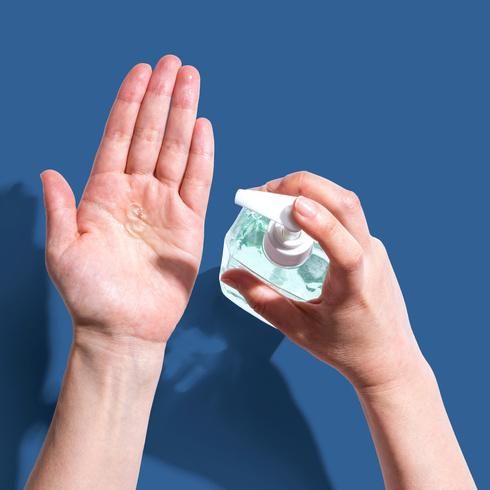
Sneeze guards
Sneeze guards are a must for keeping your staff and delegates safe. Designed to prevent the spread of infection from one person to another, these guards are easy to move and place in whatever configuration you need, whether that's for between catering staff and hungry delegates, or in meetings and roundtable discussions where delegates may be sat in close proximity for a prolonged period of time.
There are different types you can go for which should be considered. For staff who may need to interact with delegates, such as scanning QR codes on entry, we recommend these ones. For delegates, we advise these sneeze guards, which are more enclosed.
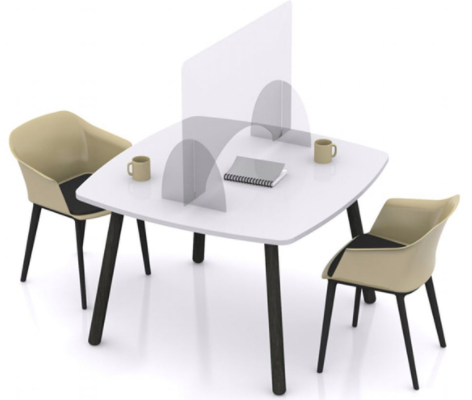
Things to remember
- Make sure you don't buy PPE that supplies the NHS, as this can lead to shortages and divert supplies from those who need them most. We've made sure all of the PPE at the Hire Space Safer Events Shop is not used by the NHS.
- Wearing masks and applying hand sanitiser regularly is new for most of us, but it is really important. Being firm with your delegates on the rules is critical to ensure the safety of themselves, other delegates, and of course venue staff and organisers. Make posters to display at the entrance and around the venue informing them that if they are not wearing a mask (and don't have a good reason not to do so) or complying with social distancing and other hygiene measures that they will be denied entrance and may be asked to leave.
- Hire Space have created Venue Packs and Delegate Packs containing all the supplies venues and attendees will need for an event.
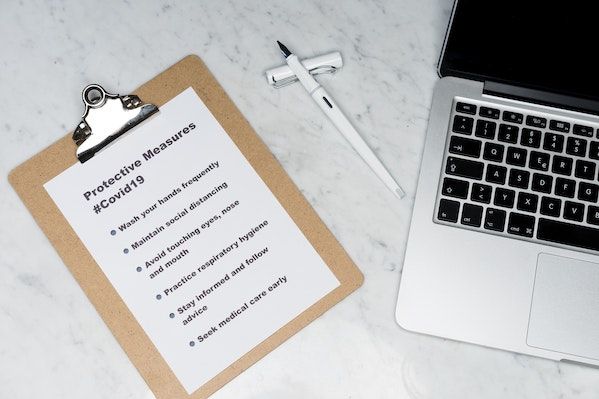
We hope this guide gives you a starting point to buying your PPE and brings you one step closer to get back to organising events again.
Download our Safer Events White Paper - A Framework For Action below for more information on our Safer Events Accreditation for venues and organisers and the hygiene and safety measures you should be putting in place. And make sure to visit our Safer Events Shop for all your PPE needs!
Next, read this piece on a Lunch and Learn we recently took part in with Oddity Events, all about delivering safer events in 2020 and beyond.




